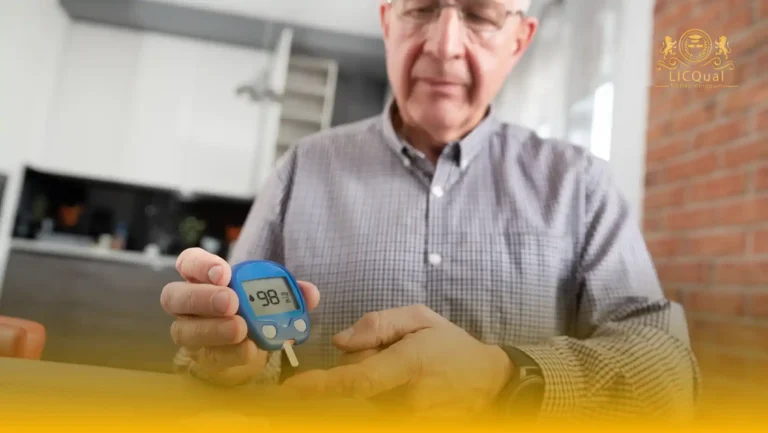The LICQual Level 3 Certificate in Healthcare Crisis Management is a specialized qualification designed for experienced professionals working within healthcare and related sectors who are seeking to advance their expertise and strengthen their career prospects. This programme is not intended for fresh candidates; instead, it has been developed for individuals who already possess industry knowledge and wish to enhance their capabilities in managing crises, mitigating risks, and ensuring patient safety during challenging situations.
Healthcare organisations today face complex emergencies ranging from medical crises and operational disruptions to public health incidents. This certificate equips learners with the skills and confidence to respond effectively, coordinate resources, and implement strategic crisis management plans. By undertaking this qualification, learners can expand their professional knowledge, contribute to organisational resilience, and fulfil their Continuing Professional Development (CPD) requirements.
Centres offering this qualification must demonstrate a strong commitment to quality by ensuring they have fully qualified and competent staff, along with all the essential resources and learning materials required to deliver outstanding training. This ensures that learners receive an engaging, supportive, and professional learning experience that prepares them to excel in crisis management roles within healthcare.
The LICQual Level 3 Certificate in Healthcare Crisis Management not only supports career progression but also strengthens the healthcare sector’s capacity to handle emergencies with professionalism and care.
Course Overview
Qualification Title
LICQual Level 3 Certificate in Healthcare Crisis Management
Total Units
6
Total Credits
24
GLH
120
Qualification #
LICQ2200721
Qualification Specification
To enroll in the LICQual Level 3 Certificate in Healthcare Crisis Management, applicants must meet the following criteria:
|
Qualification# |
Unit Title |
Credits |
GLH |
|---|---|---|---|
|
LICQ2200721-1 |
Principles of Healthcare Crisis Management |
4 |
20 |
|
LICQ2200721-2 |
Risk Assessment and Emergency Preparedness in Healthcare |
4 |
20 |
|
LICQ2200721-3 |
Crisis Communication and Stakeholder Engagement |
4 |
20 |
|
LICQ2200721-4 |
Operational Response and Incident Command Systems |
4 |
20 |
|
LICQ2200721-5 |
Ethical and Legal Considerations in Healthcare Crisis Management |
4 |
20 |
|
LICQ2200721-6 |
Post-Crisis Recovery and Organisational Resilience |
4 |
20 |
By the end of this course, learners will be able to:
Unit 1: Principles of Healthcare Crisis Management
By the end of this unit, learners will be able to:
- Explain the fundamental concepts and principles of crisis management in healthcare.
- Identify common types of healthcare crises and their potential impacts.
- Analyse the role of crisis management in ensuring patient safety and service continuity.
- Apply recognised frameworks to healthcare crisis management scenarios.
Unit 2: Risk Assessment and Emergency Preparedness in Healthcare
By the end of this unit, learners will be able to:
- Conduct structured risk assessments to identify vulnerabilities in healthcare environments.
- Develop and implement effective emergency preparedness strategies.
- Evaluate the importance of contingency planning in healthcare organisations.
- Apply risk management tools to reduce the likelihood and impact of healthcare crises.
Unit 3: Crisis Communication and Stakeholder Engagement
By the end of this unit, learners will be able to:
- Demonstrate effective communication strategies during healthcare crises.
- Engage internal teams, external stakeholders, and the public during emergencies.
- Assess the role of leadership and transparency in crisis communication.
- Apply best practices in stakeholder management for healthcare crisis situations.
Unit 4: Operational Response and Incident Command Systems
By the end of this unit, learners will be able to:
- Explain the functions and structure of incident command systems in healthcare.
- Implement operational response strategies for healthcare emergencies.
- Coordinate multidisciplinary teams to ensure effective crisis response.
- Assess the effectiveness of command systems in achieving timely interventions.
Unit 5: Ethical and Legal Considerations in Healthcare Crisis Management
By the end of this unit, learners will be able to:
- Identify key ethical issues associated with healthcare crisis decision-making.
- Evaluate the legal frameworks and compliance requirements in crisis management.
- Analyse the balance between patient rights, ethical duties, and organisational responsibilities.
- Apply ethical reasoning to decision-making in healthcare crisis scenarios.
Unit 6: Post-Crisis Recovery and Organisational Resilience
By the end of this unit, learners will be able to:
- Develop recovery plans to restore healthcare operations following a crisis.
- Evaluate lessons learned from crisis events to improve organisational preparedness.
- Promote resilience strategies for healthcare teams and systems.
- Apply continuous improvement methods to strengthen future crisis management.
This course is designed for healthcare professionals who want to lead, manage, and optimize crisis response within healthcare organizations. It is ideal for experienced staff working in clinical, managerial, or administrative roles who want to strengthen their skills in emergency planning, risk management, and operational leadership. This program equips professionals to handle crises effectively, maintain patient safety, and enhance organizational resilience.
Healthcare Managers and Administrators
- Oversee hospital and clinic operations during emergencies
- Coordinate crisis response plans across departments
- Ensure compliance with healthcare safety and regulatory standards
- Allocate resources efficiently during high-pressure situations
- Manage budgets and operational workflows during crises
- Strengthen organizational preparedness and resilience
Clinical Professionals and Practitioners
- Deliver safe and effective care during healthcare emergencies
- Lead clinical teams in high-pressure situations
- Implement crisis protocols in daily patient care workflows
- Monitor patient outcomes and safety during incidents
- Improve decision-making in urgent and critical scenarios
- Enhance operational effectiveness under emergency conditions
Crisis Response Coordinators
- Plan, execute, and monitor healthcare emergency initiatives
- Track incident response and recovery strategies
- Facilitate clear communication among teams during crises
- Implement risk management and mitigation strategies
- Optimize operational workflows for rapid response
- Ensure successful delivery of crisis management objectives
Quality Assurance and Risk Management Professionals
- Monitor compliance and safety standards during crises
- Conduct audits of emergency response processes
- Identify operational and clinical risks proactively
- Implement policies to reduce risk and improve safety
- Ensure adherence to healthcare regulations
- Drive continuous improvement in crisis management protocols
Healthcare Policy and Strategy Professionals
- Develop crisis management policies and frameworks
- Align emergency initiatives with organizational objectives
- Analyze trends to improve crisis planning and outcomes
- Integrate operational and risk management strategies
- Ensure regulatory compliance in all emergency processes
- Drive innovation and resilience across healthcare services
Healthcare Leadership and Innovation Professionals
- Lead initiatives to enhance organizational crisis readiness
- Manage multiple emergency response projects simultaneously
- Implement innovative solutions to complex healthcare challenges
- Combine clinical knowledge with operational leadership skills
- Improve patient outcomes through effective crisis planning
- Promote a culture of safety, resilience, and proactive management
Centres intending to deliver the LICQual Level 3 Certificate in Healthcare Crisis Management must meet specific requirements to ensure the highest standards of training, learner support, and successful outcomes. These requirements are aligned with international quality benchmarks for vocational and professional education.
To deliver this qualification effectively, centres must have:
- Qualified and Competent Trainers: Trainers and assessors must hold relevant academic or professional qualifications in healthcare, crisis management, or a related discipline, along with experience in delivering vocational training.
- Appropriate Learning Resources: Centres must provide up-to-date course materials, reference texts, case studies, and digital resources that reflect current best practices in healthcare crisis management.
- Suitable Facilities and Equipment: Training should be delivered in an environment that supports interactive learning, with access to ICT tools, presentation equipment, and crisis simulation activities where applicable.
- Assessment and Quality Assurance Systems: Centres must have robust internal quality assurance policies and assessment procedures to maintain consistency, fairness, and compliance with awarding body standards.
- Learner Support Services: Centres should ensure that learners have access to academic guidance, CPD support, and resources to help them complete the qualification successfully.
- Commitment to Professional Standards: Centres must demonstrate a commitment to maintaining professional and ethical standards in teaching, learning, and assessment practices.
By meeting these requirements, centres can deliver high-quality training that enables learners to gain the essential skills, knowledge, and confidence to manage healthcare crises effectively and advance their professional careers.
Assessment and Verification
All units within this qualification are subject to internal assessment by the approved centre and external verification by LICQual. The qualification follows a criterion-referenced assessment approach, ensuring that learners meet all specified learning outcomes.
To achieve a ‘Pass’ in any unit, learners must provide valid, sufficient, and authentic evidence demonstrating their attainment of all learning outcomes and compliance with the prescribed assessment criteria. The Assessor is responsible for evaluating the evidence and determining whether the learner has successfully met the required standards.
Assessors must maintain a clear and comprehensive audit trail, documenting the basis for their assessment decisions to ensure transparency, consistency, and compliance with quality assurance requirements.







